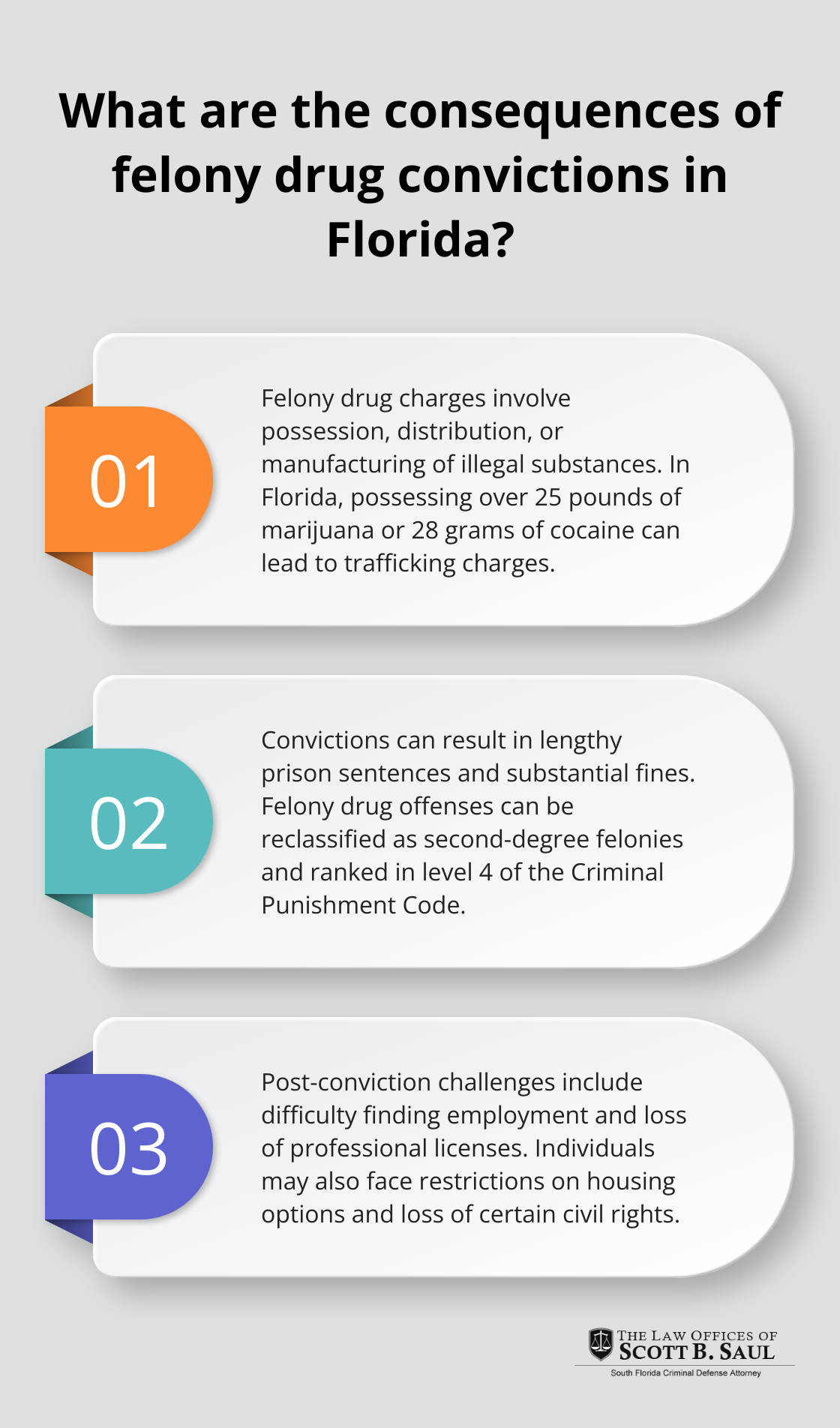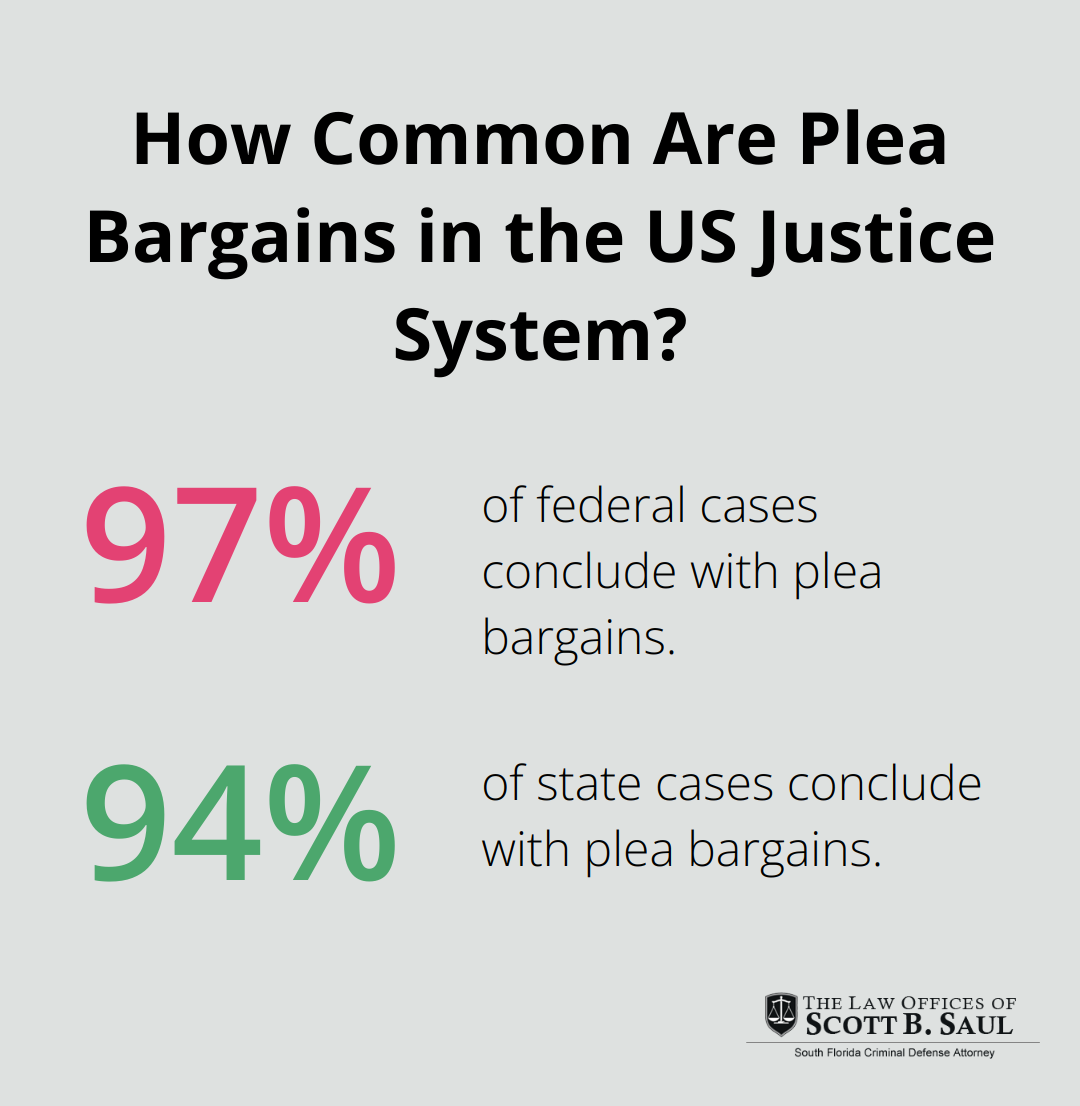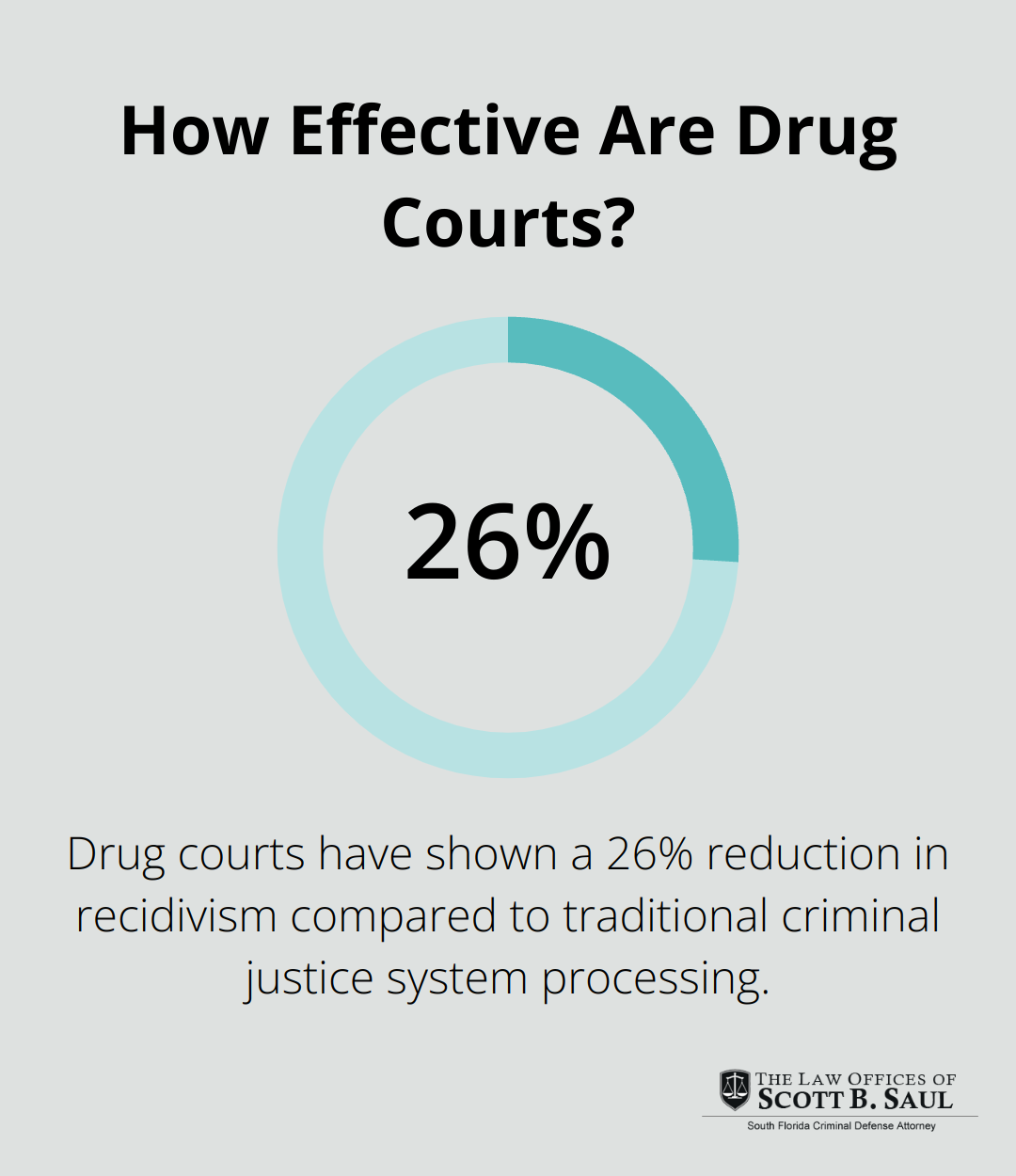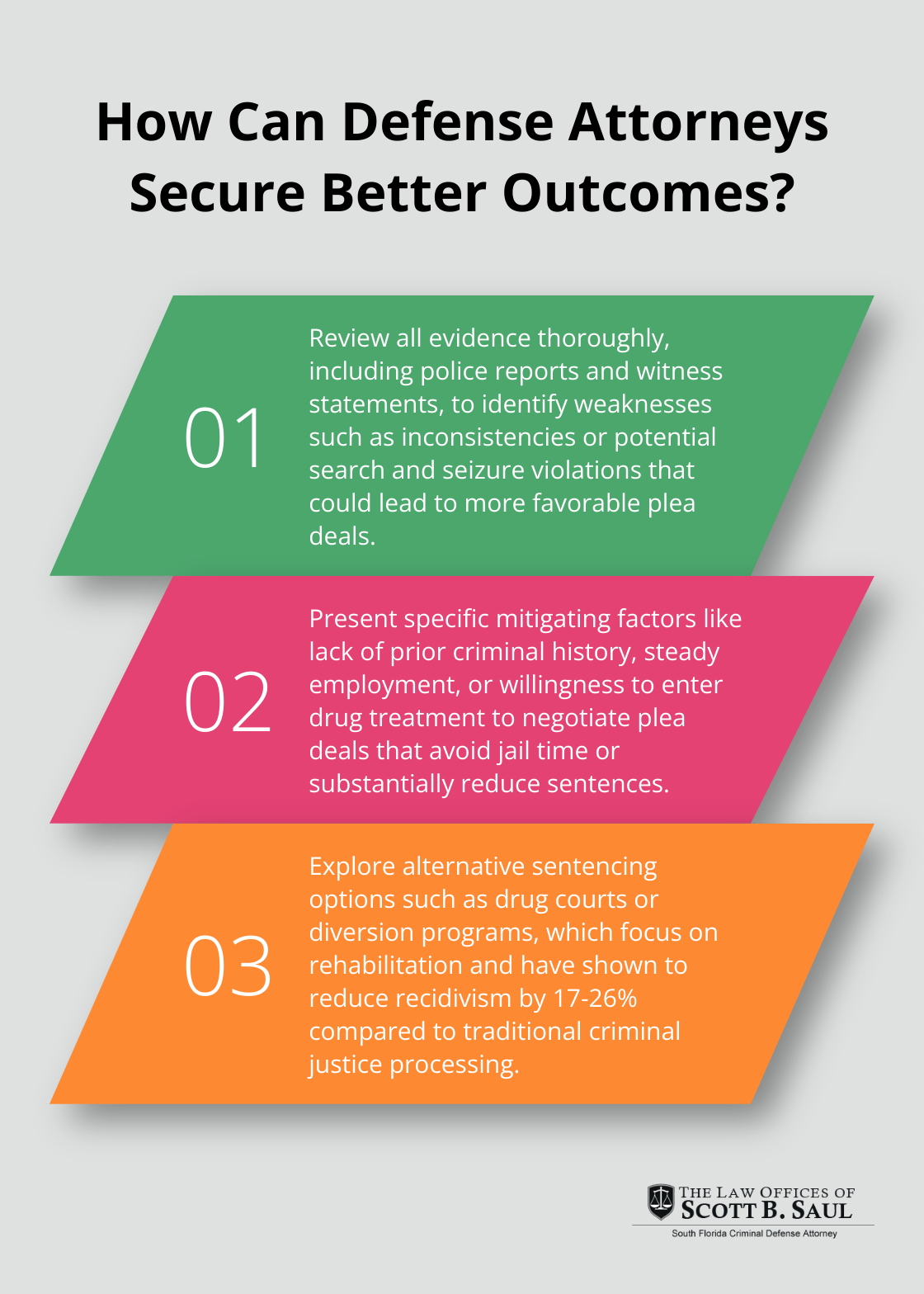How to Navigate a Plea Bargain for Felony Drug Charges
By : saulcrim | Category : Criminal Defense | Comments Off on How to Navigate a Plea Bargain for Felony Drug Charges
7th Apr 2025

Facing felony drug charges can be overwhelming, but understanding your options is crucial. At Law Offices of Scott B. Saul, we’ve seen how a plea bargain for felony drug charges can significantly impact the outcome of a case.
This guide will walk you through the process, strategies, and considerations involved in navigating plea bargains for serious drug offenses. We’ll help you make informed decisions about your legal future.
Understanding Felony Drug Charges
Definition of Felony Drug Charges
Felony drug charges represent serious criminal offenses that carry severe penalties. These charges typically involve the possession, distribution, or manufacturing of illegal substances in significant quantities. In Florida, felony drug charges can result in life-altering consequences, including lengthy prison sentences and substantial fines.
Common Types of Felony Drug Offenses
The most prevalent felony drug offenses include:
- Drug Trafficking: This charge often arises when an individual possesses large quantities of illegal drugs. In Florida, possession of more than 25 pounds of marijuana or 28 grams of cocaine can lead to trafficking charges.
- Possession with Intent to Distribute: Law enforcement bases this charge on factors such as the quantity of drugs found, packaging materials, or large amounts of cash.
- Manufacturing Controlled Substances: This offense typically involves the production of synthetic drugs (like methamphetamine) or the cultivation of marijuana plants.
Potential Consequences of a Conviction
The penalties for felony drug convictions are severe and long-lasting. In Florida, a felony drug conviction can result in serious consequences. According to Florida Statutes, certain violations can be reclassified as a felony of the second degree and ranked in level 4 of the Criminal Punishment Code. Even after serving time, individuals with felony drug convictions face numerous challenges, including:
- Difficulty finding employment
- Loss of professional licenses
- Restrictions on housing options
- Loss of certain civil rights (e.g., voting or owning firearms)
- Potential deportation for non-citizens
Recent data shows that drug offenses contribute significantly to the prison population across state prisons, local jails, federal prisons, and youth facilities.
The Role of Legal Representation
The complexity and gravity of felony drug charges necessitate experienced legal representation. A skilled attorney will:
- Examine the evidence thoroughly
- Challenge unlawful searches and seizures
- Explore all possible defenses to protect clients’ rights and freedom
(It’s worth noting that the Law Offices of Scott B. Saul, with over 30 years of expertise, specializes in defending against these serious charges.)

As we move forward, we’ll explore the plea bargaining process, which often plays a significant role in resolving felony drug cases. Understanding this process can provide valuable insights for those facing such charges.
How Plea Bargaining Works in Felony Drug Cases
The Mechanics of Plea Bargaining
Plea bargaining is a cornerstone of the criminal justice system, especially in felony drug cases. This negotiation process between the prosecution and defense can dramatically alter the outcome of a case. A plea bargain involves a defendant pleading guilty to a lesser charge or accepting a reduced sentence to avoid a trial. In felony drug cases, this might mean pleading guilty to misdemeanor possession instead of felony distribution, or accepting a shorter prison term.

The National Association of Criminal Defense Lawyers reports that over 97% of federal cases and 94% of state cases conclude with plea bargains. These statistics highlight the prevalence and significance of this process in our legal system.
Advantages for Defendants
Plea bargaining offers several benefits to defendants facing felony drug charges:
- Less Severe Penalties: A defendant charged with drug trafficking might negotiate a plea to simple possession, potentially reducing a 15-year sentence to 2 years or less.
- Certainty: Trials are unpredictable, and a guilty verdict could result in maximum sentences. Accepting a plea provides defendants with a clear understanding of their consequences.
- Faster Resolution: Plea bargains resolve cases more quickly, reducing the stress and financial burden of prolonged legal proceedings. This can particularly benefit defendants in pretrial detention.
Key Players and Their Roles
The main participants in plea negotiations include:
- Prosecutors: They aim to secure convictions while managing their caseload efficiently. Prosecutors may offer plea deals to avoid resource-intensive trials.
- Defense Attorneys: They advocate for their clients’ best interests. Experienced attorneys (like those at Law Offices of Scott B. Saul) leverage their expertise to negotiate favorable terms, often seeking alternatives to incarceration such as drug treatment programs or probation.
- Defendants: They make the final decision on whether to accept a plea offer. This decision should follow thorough consultation with their attorney and careful consideration of the evidence and potential outcomes.
- Judges: They must approve plea agreements. While judges typically accept negotiated pleas, they can reject agreements they deem unfair or not in the interest of justice.
The Negotiation Process
The plea bargaining process often involves multiple rounds of negotiations. Defense attorneys may present mitigating factors (such as a defendant’s clean prior record or willingness to enter rehabilitation) to secure better terms. Prosecutors, in turn, may adjust their offers based on the strength of their evidence and the defendant’s cooperation.
Understanding these dynamics proves essential for effective navigation of the plea bargaining process. It requires skill, experience, and a deep understanding of both the law and the local legal landscape.
As we move forward, we’ll explore specific strategies that can enhance your position during plea negotiations for felony drug charges.
Winning Strategies for Plea Bargaining
Scrutinize the Evidence
The first step in any plea negotiation involves a thorough review of the prosecution’s evidence. This includes police reports, witness statements, and physical evidence. Look for weaknesses such as inconsistencies in witness accounts or potential violations of search and seizure laws. A careful review can reveal critical flaws that lead to more favorable plea deals (e.g., suppression of key evidence due to illegal searches).
Leverage Mitigating Factors
Presenting mitigating factors can significantly influence plea negotiations. These might include a defendant’s lack of prior criminal history, steady employment, or willingness to enter drug treatment. Emphasizing these factors can result in plea deals that avoid jail time or reduce sentences substantially.
Explore Alternative Sentencing
Drug courts and diversion programs offer alternatives to traditional sentencing. These programs focus on rehabilitation rather than punishment and can benefit first-time offenders particularly. According to the National Institute of Justice, drug courts have shown reductions in recidivism ranging from 17 to 26 percent compared to traditional criminal justice system processing.
Time Your Negotiations
The timing of plea negotiations can impact the outcome significantly. Early negotiations might lead to more favorable terms, especially if the prosecution hasn’t fully prepared its case. However, waiting until closer to trial can sometimes reveal weaknesses in the prosecution’s case that strengthen your negotiating position.
Understand the Local Landscape
Knowledge of local court practices and prosecutor tendencies proves invaluable. Different jurisdictions may approach plea bargaining in drug cases differently. Some Florida counties, for example, show more openness to treatment-based solutions, while others take a harder line. This local insight allows for more targeted and effective negotiation strategies. Plea bargaining is a defining feature of the federal criminal justice system. A skilled defense attorney can help navigate this process and potentially secure more favorable outcomes.

Final Thoughts
A plea bargain for felony drug charges requires a strategic approach and deep understanding of the legal landscape. The process offers an opportunity to reduce charges or sentences, but demands careful consideration. Reviewing evidence, leveraging mitigating factors, and exploring alternative sentencing options are all important steps in this process.

Experienced legal representation plays a vital role in successfully navigating a plea bargain. An attorney with extensive knowledge of drug laws and local court practices can make a substantial difference in the outcome of your case. They can identify weaknesses in the prosecution’s case, present compelling mitigating factors, and negotiate effectively on your behalf.
We at Law Offices of Scott B. Saul have extensive experience in criminal defense, particularly in cases involving felony drug charges. Our expertise gives us unique insights into crafting strong defense strategies and negotiating favorable plea bargains. Your active involvement in your defense is important; stay informed, ask questions, and work closely with your legal counsel.
Archives
- December 2025 (8)
- November 2025 (8)
- October 2025 (8)
- September 2025 (9)
- August 2025 (8)
- July 2025 (8)
- June 2025 (9)
- May 2025 (9)
- April 2025 (8)
- March 2025 (9)
- February 2025 (8)
- January 2025 (9)
- December 2024 (10)
- November 2024 (5)
- July 2024 (2)
- June 2024 (2)
- May 2024 (2)
- April 2024 (2)
- March 2024 (2)
- February 2024 (2)
- January 2024 (2)
- December 2023 (2)
- November 2023 (2)
- October 2023 (2)
- September 2023 (2)
- August 2023 (1)
- July 2023 (2)
- June 2023 (2)
- May 2023 (2)
- April 2023 (2)
- March 2023 (2)
- February 2023 (2)
- January 2023 (2)
- December 2022 (2)
- November 2022 (2)
- October 2022 (2)
- September 2022 (2)
- August 2022 (2)
- July 2022 (2)
- June 2022 (2)
- May 2022 (2)
- April 2022 (2)
- March 2022 (2)
- February 2022 (2)
- January 2022 (2)
- December 2021 (2)
- November 2021 (2)
- October 2021 (2)
- September 2021 (2)
- August 2021 (2)
- July 2021 (2)
- June 2021 (2)
- May 2021 (2)
- April 2021 (2)
- September 2020 (5)
- July 2020 (4)
- June 2020 (4)
- May 2020 (4)
- April 2020 (5)
- March 2020 (4)
- February 2020 (4)
- January 2020 (4)
- December 2019 (1)
- November 2019 (4)
- October 2019 (4)
- September 2019 (4)
- August 2019 (4)
- July 2019 (5)
- June 2019 (4)
- May 2019 (4)
- April 2019 (4)
- March 2019 (4)
- February 2019 (4)
- January 2019 (4)
- December 2018 (4)
- November 2018 (5)
- October 2018 (5)
- September 2018 (4)
- August 2018 (4)
- July 2018 (7)
- June 2018 (4)
- May 2018 (4)
- April 2018 (8)
- March 2018 (4)
- February 2018 (4)
- January 2018 (4)
- November 2017 (4)
- October 2017 (4)
- September 2017 (4)
- August 2017 (7)
- July 2017 (6)
- June 2017 (4)
- May 2017 (4)
- April 2017 (4)
- March 2017 (4)
- February 2017 (7)
- January 2017 (4)
- December 2016 (7)
- November 2016 (4)
- October 2016 (4)
- September 2016 (10)
- August 2016 (4)
- July 2016 (4)
- June 2016 (4)
- May 2016 (4)
- April 2016 (4)
- March 2016 (4)
- February 2016 (7)
- January 2016 (4)
- December 2015 (5)
- November 2015 (4)
- October 2015 (7)
- September 2015 (4)
- August 2015 (4)
- July 2015 (13)
- June 2015 (9)
- May 2015 (8)
- April 2015 (6)
- March 2015 (4)
- February 2015 (4)
- January 2015 (4)
- December 2014 (4)
- November 2014 (4)
- October 2014 (4)
- September 2014 (3)
Categories
- Adjudication (1)
- Bankruptcy (1)
- Burglary Crimes (3)
- calendar call (1)
- Car Accident (1)
- Criminal Defense (380)
- Cyber Crimes (7)
- DNA (1)
- Domestic Violence (9)
- Drug Crimes (5)
- DUI (12)
- Embezzlement (1)
- Environmental Crimes (4)
- Expungement Law (2)
- Federal Sentencing Law (3)
- Firearm (3)
- Forgery (4)
- General (82)
- Healthcare (3)
- Immigration (1)
- Indentity Theft (1)
- Insurance (5)
- judicial sounding (2)
- Juvenile Crimes (4)
- Manslaughter (4)
- Money Laundering (3)
- Organized Crime (1)
- Racketeering (1)
- Reckless Driving (3)
- RICO (3)
- Sealing and Expunging (2)
- Sex Offense (1)
- Shoplifting (1)
- Suspended Driver's License (1)
- Traffic (4)
- Trending Topics (1)
- White-collar Offenses (1)

